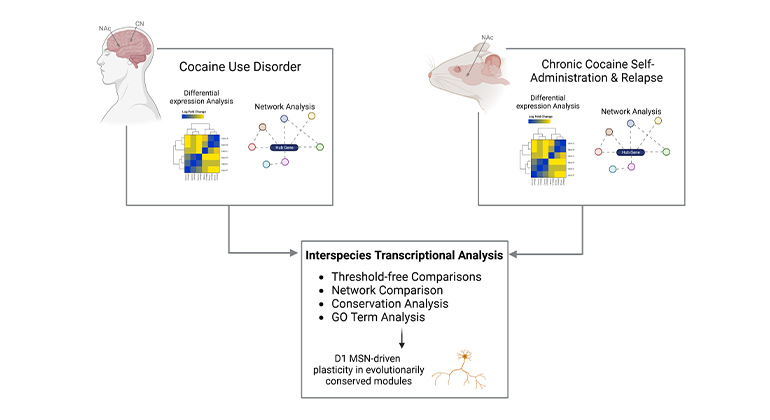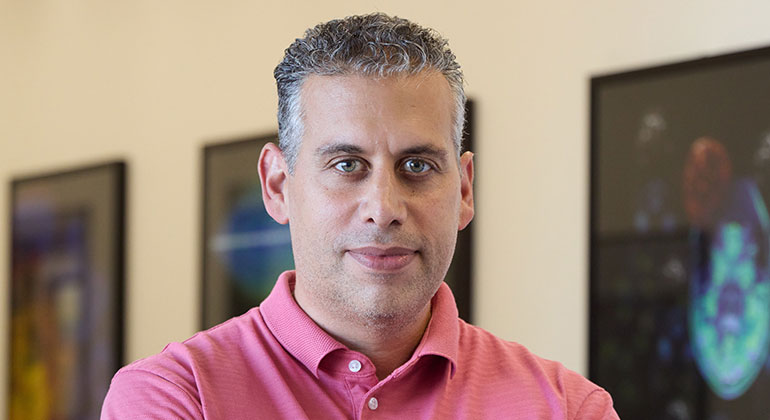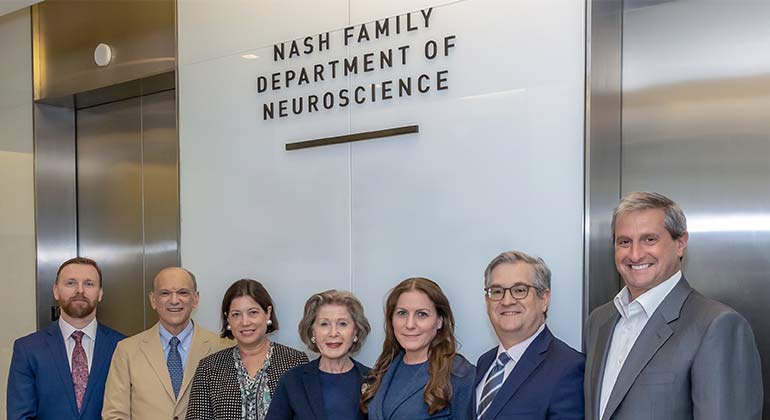Blocking a Hormone That Acts on Brain Cells Limits Alzheimer’s Symptoms in Mice, Mount Sinai Researchers Discover

Mount Sinai researchers have learned from a study with mice that increased levels of a hormone produced by the pituitary gland that acts on brain cells could explain the disproportionate increase and severity of Alzheimer’s disease in post-menopausal women.
In the study, published in Nature, the Mount Sinai team, in collaboration with researchers from Emory School of Medicine, reported that blocking the action of follicle-stimulating hormone (FSH) on brain cells significantly reduced the debilitating effects of Alzheimer’s disease in mice, laying the foundation for a new drug therapy that might also impact osteoporosis and obesity.
“We are excited and cautiously optimistic that the molecule FSH may play an important role in Alzheimer’s disease, bone loss, and obesity simultaneously,” says senior author Mone Zaidi, MD, PhD, Director of the Center for Translational Medicine and Pharmacology and Professor of Medicine, and Pharmacological Sciences, at the Icahn School of Medicine at Mount Sinai. “Based on that finding, we have developed and hope to soon test a humanized monoclonal antibody that blocks FSH and could have enormous public health implications by potentially treating all three conditions.”
Few diseases have been more resistant to treatment than Alzheimer’s. The incidence of the crippling neurodegenerative disorder is particularly high among women after menopause, tracking closely with an increase in visceral adiposity (fat in the abdominal cavity), bone loss, and impaired energy balance. The Mount Sinai study, done collaboratively with senior author Keqiang Ye, PhD, from Emory, was designed to test whether high levels of FSH drive Alzheimer’s and, if so, whether blocking the hormone might prevent onset of the disease.
By conducting experiments in both labs, the researchers learned that FSH triggers features of Alzheimer’s disease in mouse models by acting on neuronal FSH receptors in the most vulnerable regions of the brain. Specifically, they found that FSH acts directly on the hippocampus and cortical neurons to accelerate deposition of the proteins amyloid-β and tau, the hallmarks of Alzheimer’s, and to impair cognition in mice displaying features of the disease. The teams also showed that blocking the activity of FSH with a highly targeted polyclonal antibody developed at Mount Sinai that binds to a short region of the FSH protein, or by reducing expression of the FSH receptor gene in the hippocampus, significantly reduces Alzheimer’s disease-like features in mice.
“We demonstrated that blocking FSH not only dampens Alzheimer’s disease pathology, but reduces bone loss and body fat in mouse models,” explain Dr. Zaidi, whose previous research on FSH’s effect on fat, published in Nature, was among the eight “notable advances” in biomedicine in 2017 named by Nature Medicine. “These results could provide the framework for development of a single FSH blocking agent to be used in humans for treating Alzheimer’s disease, obesity, and osteoporosis—conditions that affect millions of people worldwide.”
To that end, the Mount Sinai team recently published the development and characterization of a new humanized monoclonal antibody in the Proceedings of the National Academy of Sciences. “We have generated significant preclinical data by testing its efficacy and safety in animal models, and are greatly encouraged by the results, thanks to recent funding by the National Institute on Aging,” says Dr. Zaidi. He hopes to soon begin testing the antibody in early-stage clinical trials.
“This innovative study by Dr. Zaidi and colleagues exemplifies efforts at Mount Sinai based in bidirectional translational research. In this case, a novel discovery in patients with Alzheimer’s disease prompted studies in laboratory mice to understand underlying mechanisms and test possible approaches towards new therapies,” says Eric J. Nestler, MD, PhD, Nash Family Professor of Neuroscience, Director of The Friedman Brain Institute, and Dean for Academic Affairs of Icahn Mount Sinai, and Chief Scientific Officer of the Mount Sinai Health System. “The work now sets the stage for testing a fundamentally original way of treating Alzheimer’s disease.”
In addition to helping scientists better understand the pathophysiology of Alzheimer’s disease, Dr. Zaidi believes his research has “reaffirmed our view that pituitary hormones such as FSH have ubiquitous body actions, some of which are yet to be characterized, and that other chronic diseases like high cholesterol levels could be the focus of future studies involving FSH.”
About the Mount Sinai Health System
Mount Sinai Health System is one of the largest academic medical systems in the New York metro area, with 48,000 employees working across seven hospitals, more than 400 outpatient practices, more than 600 research and clinical labs, a school of nursing, and a leading school of medicine and graduate education. Mount Sinai advances health for all people, everywhere, by taking on the most complex health care challenges of our time—discovering and applying new scientific learning and knowledge; developing safer, more effective treatments; educating the next generation of medical leaders and innovators; and supporting local communities by delivering high-quality care to all who need it.
Through the integration of its hospitals, labs, and schools, Mount Sinai offers comprehensive health care solutions from birth through geriatrics, leveraging innovative approaches such as artificial intelligence and informatics while keeping patients’ medical and emotional needs at the center of all treatment. The Health System includes approximately 9,000 primary and specialty care physicians and 10 free-standing joint-venture centers throughout the five boroughs of New York City, Westchester, Long Island, and Florida. Hospitals within the System are consistently ranked by Newsweek’s® “The World’s Best Smart Hospitals, Best in State Hospitals, World Best Hospitals and Best Specialty Hospitals” and by U.S. News & World Report's® “Best Hospitals” and “Best Children’s Hospitals.” The Mount Sinai Hospital is on the U.S. News & World Report® “Best Hospitals” Honor Roll for 2025-2026.
For more information, visit https://www.mountsinai.org or find Mount Sinai on Facebook, Instagram, LinkedIn, X, and YouTube.

Two Leading Mount Sinai Brain Scientists Elected to the National Academy of Sciences
May 05, 2022 View All Press Releases
Mount Sinai Neurobiologist Selected as a Howard Hughes Medical Institute Investigator
Sep 23, 2021 View All Press Releases




